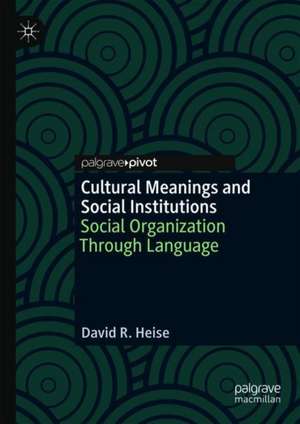Cultural Meanings and Social Institutions: Social Organization Through Language
Autor David R. Heiseen Limba Engleză Hardback – 3 ian 2019
Preț: 417.14 lei
Nou
Puncte Express: 626
Preț estimativ în valută:
79.82€ • 83.51$ • 66.31£
79.82€ • 83.51$ • 66.31£
Carte tipărită la comandă
Livrare economică 02-16 aprilie
Preluare comenzi: 021 569.72.76
Specificații
ISBN-13: 9783030037383
ISBN-10: 303003738X
Pagini: 124
Ilustrații: XI, 124 p. 1 illus.
Dimensiuni: 148 x 210 mm
Greutate: 0.32 kg
Ediția:1st ed. 2019
Editura: Springer International Publishing
Colecția Palgrave Pivot
Locul publicării:Cham, Switzerland
ISBN-10: 303003738X
Pagini: 124
Ilustrații: XI, 124 p. 1 illus.
Dimensiuni: 148 x 210 mm
Greutate: 0.32 kg
Ediția:1st ed. 2019
Editura: Springer International Publishing
Colecția Palgrave Pivot
Locul publicării:Cham, Switzerland
Cuprins
Chapter 1. Language and Social Institutions.- Chapter 2. Analyzing Meanings of Identities.- Chapter 3. Dictionary Meanings of Identities.- Chapter 4. Contextual Meanings of Identities.- Chapter 5. Associative Meanings of Identities.- Chapter 6. Types of Meaning Compared.- Chapter 7. Meanings and Institutional Domains.
Notă biografică
David R. Heise is Rudy Professor of Sociology Emeritus, Indiana University, USA, and has previously served as editor of the journals Sociological Methodology and Sociological Methods & Research. His social psychological research focuses on the affective and logical foundations of social interaction. Heise has received Distinguished Career awards from four sections of the American Sociological Association—Social Psychology, Sociology of Emotions, Mathematical Sociology, and Methodology—and from the International Academy for Intercultural Research.
Textul de pe ultima copertă
Employing three methods of assessing meaning, this book demonstrates that the thousands of human identities in English coalesce into groups that are recognizable as role sets in the contemporary social institutions of economy, kinship, religion, polity, law, education, medicine, sport, and arts. After establishing a theoretical and a methodological framework for his empirical work, David Heise presents the results obtained when meanings are assessed via dictionary definitions, collocates, and word associations. A close comparison of the results reveals that similar outcomes are obtained through each of these three different approaches of defining meaning. The final chapter summarizes the study, considers the benefits and limitations of studying society via language, and applies the results to describing how individuals operate social institutions via their daily social interactions. Aspects of this book will be of interest to social psychologists, sociologists, and linguists.
Caracteristici
Analyzes institutional domains through quantitative analyses of word meanings Develops a model of how language, cultural meanings, self and identities, and roles are connected Establishes that social institutions work as a bridge between individual definitions (of self and others) and broader societal functions
